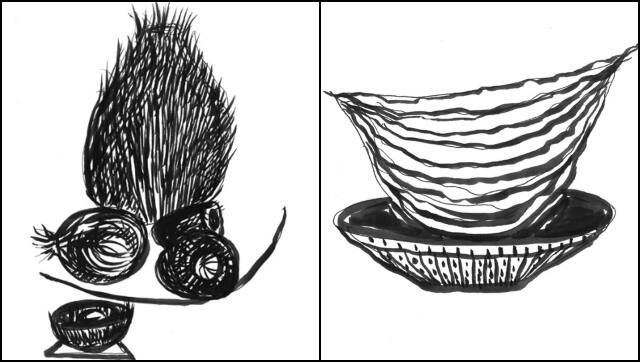My first taste of Indian Jewish food was at the Knesset Eliyahoo Synagogue in Mumbai. It was Passover, and the communal meal we were served in a spacious dining room below the prayer hall was simple and delicious. It followed a certain order, and included prayers and song. The food stood out because it was familiar to me — heavy on the spice, with masalas and gravies and fragrant pulaos and biryanis. It was my glimpse into how the cuisine of Indian Jews successfully combined religious customs and dietary laws with local culinary traditions. Now, a new cookbook aims to capture this cultural essence of India’s Jewish community. Bene Appétit: The Cuisine of the Indian Jews, published by HarperCollins, is author Esther David’s attempt at showcasing the largely unknown food practices and dishes of one of India’s smallest religious communities. David is a Bene Israel Jew who is based in Ahmedabad. Before turning to literature, she was an art critic, columnist and professor of Art History. Her first novel, Book of Rachel, won the Sahitya Akademi Award for English Literature in 2010. Bene Appétit is her eleventh book. In it, she introduces readers to the main Jewish communities in India: Bene Israel Jews, Cochin Jews, Baghdadi Jews, Bene Ephraim Jews and Bene Menashe Jews. It’s a quick read, with simple recipes. Each chapter acquaints the reader with these communities, their main festivals and the food that is part of those celebrations. The dishes are similar — fish, egg, and chicken curries; pancakes; chutneys; stews; pulaos and more — with minor tweaks that are reflective of the region the community resides in, and/or the availability of ingredients. Some interesting dishes include pastillas (similar to chicken pies), meruba (a jam-like pickle made with pears and apples), boli (a sweet flatbread like puran poli), arook (minced meat fritters), hilbe ( a fenugreek seed chutney); and otenga (elephant apple) curry. [caption id=“attachment_9845101” align=“alignnone” width=“640”]
 Sketches of food by Esther David, which feature in Bene Appetit. (L) Coconuts and coconut milk, (R) Kippur chi puri[/caption] As part of her research, David sent out questionnaires and met with Jewish families based in Kochi, Kolkata, Andhra Pradesh, Manipur, Mizoram and Maharashtra. “They were happy to know that I’m also an Indian Jew and offered as much help as possible,” she says. In Ahmedabad, she worked with Julie Pingle, her friend and a talented Jewish cook, to document each recipe. The result is an interesting (if brief) cookbook. Edited excerpts from an interview with David: You grew up in a household where religion wasn’t enforced — tell us about this period of your life. As a child, my name was a matter of great distress. It was unlike the names of my classmates, like ‘Sheila’ or ‘Meena’. I was told our family had an Indian surname [which we no longer use], given in memory of our ancestral village where we first landed after leaving Israel, about two thousand years ago. The realisation about being Jewish began when I had to fill application forms in school and had to answer the question about religion. I would look at my parents and ask, “What is the spelling of ‘Bene Israel Jew’?” The old ‘mezuzah’ at the door, Hebrew Bibles, Jewish artefacts in the house and faded, sepia-tinted photographs of our ancestors all fascinated me. Before our family left our ancestral house, I had happy memories of our joint family and grandmother lighting the Shabbat candles, celebrating Jewish festivals and going to the synagogue for prayers, malida, Bar Mitzvahs and weddings. After my grandmother passed away, almost everything disappeared from our life. Later, I went to an Arts college and began leading life in a cosmopolitan society. The question of my name and being Jewish remained at the back of my mind. To understand these aspects of my life, I became a wandering Jew. I was in search of a homeland and wrote my first novel, The Walled City, at 50. It was then that I realised, home is not a country, city, or place, but it lies within me and my novels. I just have to open my books, and I am home. What inspired you to write this book? During the research for one of my novels, I was taken back to the time when we lived as a joint family, where traditional Jewish food was cooked almost every day. I slowly started including food in my books, when I wrote about a certain situation, event or festival. A question I was often asked was, how is Indian Jewish food different from Western Jewish food? In 2016, the Hadassah Brandeis Research Institute in the US commissioned me to document the Bene Israel Jews of Gujarat, followed by another project to study the cuisine of Indian Jews. As part of the research, I visited homes, attended events, had conversations with community members and more, to understand the lifestyle of Indian Jews. I realised that this fast-diminishing, microscopic community needed to preserve its food heritage. I’d briefly documented the cuisine of the Bene Israel Jews, so I took up this study as a challenge. This is how Bene Appétit: The Cuisine of the Indian Jews became a reality.
‘I realised that this fast-diminishing, microscopic community needed to preserve its food heritage,’ David says.
Advertisement
End of Article


)
)
)
)
)
)
)
)
)



